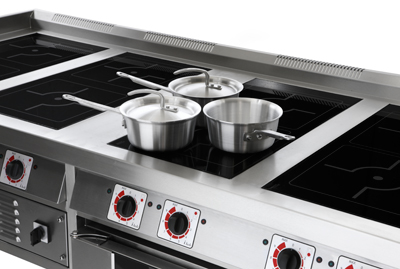The Advantages Of Using Induction Hobs
The Advantages Of Induction Hobs
Gas hobs have long been the first choice for professional kitchens all over the world. However in recent years we've seen an increasing number of foodservice establishments across the UK and Europe adopting the induction style of cooking. This method of hob based cooking is not only limited to homeowners, but professional kitchens are choosing to incorporate induction hobs into their new kitchen designs, here's a quick rundown of just why this type of cooking is becoming increasingly popular.
Speed - The process of induction means that the pan heats up much more quickly than with gas or electric radiant based cooking. Induction hobs work by using electromagnetic currents in the cooktop to trigger electromagnetic activity in the pan, so the pan effectively heats itself up without the middleman ie. flames. This means less time waiting for things to heat up so therefore the food can be cooked quicker. In a restaurant environment this means much quicker service and happy customers.
Energy efficiency - With the pan heating itself up more of that heat can go directly to the food, gas and electric hobs give off radiant heat which heats everything around them. In a professional kitchen environment this means a lot less radiant heat is emitted during cooking; a cooler kitchen means happier, more efficient chefs! Induction hobs are a much more energy efficient way to cook due to the reduced energy consumption that also comes with quicker cooking.
Safety - The hob area can be one of the most dangerous places in the kitchen whether a domestic one or a professional one. Induction hobs are much safer than gas or electric radiant hobs because it is the pan, and the product within that gets hot rather than the stove. No flames means no accidental fires, and no gas means no gas leaks.
Control - Professional chefs have always preferred gas stoves over electric as gas is much more responsive when you turn it up or down. Induction hobs are just as, if not more responsive as gas hobs when the temperature is increased or decreased. In fact, induction cooktops allow better control with smaller temperature increments and better performance at low temperatures so it's much easier to keep things warm without burning or overcooking them.
Cleaning - The fact that an induction hob doesn't get hot (other than from the heat of the pan) means that food residue doesn't burn onto the cooktop. A spillage just calls for a quick wipe rather than an intense scrub and can be done whilst in use. The surface of induction hobs are completely flat too so it's incredibly easy to wipe over compared to gas or electric radiant hobs with bits that detach and protrude!

